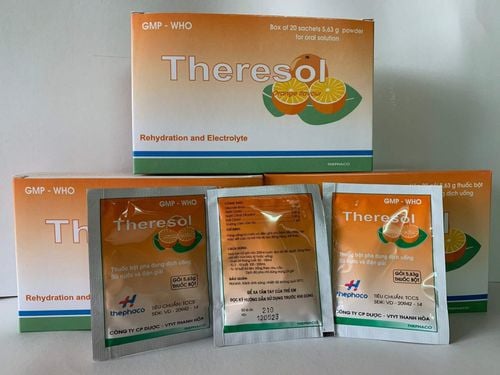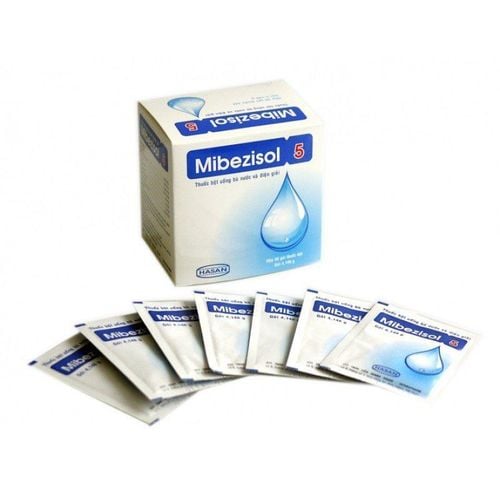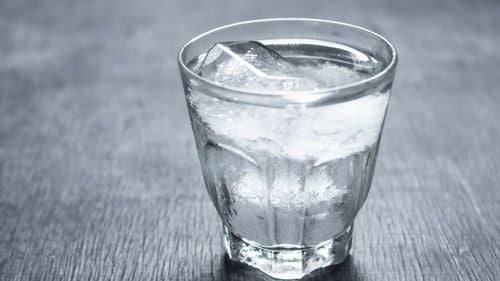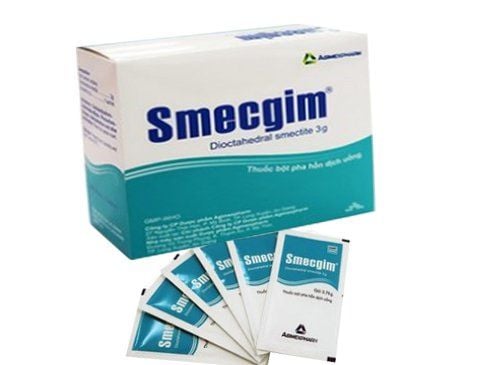This is an automatically translated article.
75% of the human body is water. Dehydration in infants is a condition in which the baby does not get enough water needed to maintain body functions.
Every day, the amount of water in the baby's body is gradually lost due to urination, sweating, crying and even breathing. Each time your baby is breastfed, he or she will replace the lost fluid. However, if an infant does not get enough water that the body needs, it can lead to dehydration. This can make the baby uncomfortable and irritable.
1. What is dehydration?
If a child is dehydrated, it means that he or she is not getting enough water that the body needs. Babies and children are more susceptible to dehydration than adults.
Dehydration can occur if the amount of water a child absorbs is less than the amount of water lost from the body, such as through vomiting, diarrhea, fever or sweating.
Dehydration can be mild and easily corrected, but it can also be moderate, severe, or even life-threatening.

Tiêu chảy có thể là nguyên nhân gây tiêu chảy ở trẻ
2. Symptoms of dehydration in infants
Signs of mild to moderate dehydration .
Any of the following signs could indicate that your baby is becoming dehydrated:
Diapers not wet after 6 hours Urine is darker in color and has a stronger odor than usual Coma Mouth and lips are dry No or very few tears when your baby cries Signs of severe dehydration:
Sunken eyes Hands and feet that are cold and look dry Excessive sleepiness or fussiness Dimpled fontanelles (soft spots on the head of the baby) baby) Wrinkled skin Peeing only 1 or 2 times a day
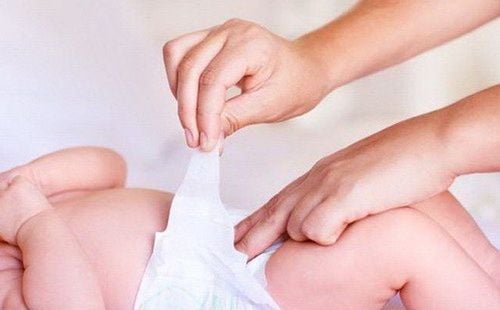
Tã không ướt sau 6 giờ là dấu hiệu của tình trạng mất nước
3. Treatment of dehydration in infants
The treatment of infant dehydration depends on the cause and severity of the condition. If your baby is only mildly dehydrated, you may just need to feed him more often and closely monitor his health. In case the child is sick with severe dehydration, take your child to the hospital for timely treatment.
Severe dehydration is an emergency. If your baby shows signs of severe dehydration: Take him to the emergency room right away. Newborns can quickly become severely dehydrated, so it's important to pay close attention to your baby's symptoms.
If your baby shows signs of mild to moderate dehydration: Call your doctor for advice.
If the child is severely dehydrated, the doctor may prescribe fluids through an intravenous (IV) tube in the hospital until rehydration. If the doctor diagnoses that the child is mildly dehydrated or medium, mothers can instruct children to drink more water.
Under 3 months: Your doctor may suggest that you feed your baby breast milk or formula, but feed them more often than usual. 3 months and older: Your baby's doctor may prescribe a special liquid - in addition to breast milk or formula - to replenish the water and salts (electrolytes) your baby's body has lost. At the same time, your doctor will work to determine the cause of your dehydration and treat the underlying problem. For example, for vomiting, your doctor may prescribe an antiemetic. If your baby has diarrhea and the doctor thinks it has something to do with his diet, you can switch him to a different formula or change his diet if he's breastfeeding.
4. Use electrolytes when your baby is dehydrated
Do not give electrolyte solutions to a child when dehydrated without consulting a doctor first.
If your doctor recommends electrolytes, you can easily buy them at most pharmacies. Pedialyte, Enfalyte and ReVital are some of the well-known branded products.
Your doctor will instruct you on the use of electrolyte fluids for your child, based on the child's weight and age. Liquids can be given slowly, sip by sip, teaspoon by teaspoon, possibly using a spoon or syringe.
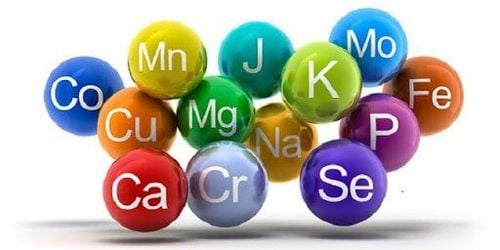
Ba mẹ có thể cho trẻ dùng chất điện giải khi có chỉ định của bác sĩ
5. Preventing dehydration in babies
You need to make sure your child is drinking plenty of water, especially on very hot days and when he is sick.
If the child is under 6 months, give breast milk or formula to supplement water. However, if you are concerned about dehydration in your child, talk to your doctor about giving your baby small amounts of water.
If your baby is 6 months or older, continue to breastfeed or bottle-feed. You can give your baby a little water each day until he eats solid foods, at which point you can increase the amount.
Do not give children carbonated soft drinks because they adversely affect children's teeth and health. Juice is not recommended for infants under 12 months.
Here's how to help prevent dehydration in some cases:
Fever. Give your baby plenty of water whenever he has a fever. If your child seems to have trouble swallowing, ask the doctor if you can give your child a pain reliever such as children's acetaminophen or ibuprofen (if your child is 6 months or older) to ease discomfort. (Do not give aspirin to children, which has been linked to a rare but serious condition called Reye's syndrome.) Too hot. Let your baby drink more water than usual when the weather is hot. Being too active on a hot day or just sitting in a stuffy, muggy room can lead to sweating and dehydration. Diarrhea. If the child has intestinal disease, especially acute gastroenteritis, the child will become dehydrated due to diarrhea and vomiting. Don't give your child fruit juice, which can only make the situation worse, and don't give your child over-the-counter diarrhea medications unless directed by your doctor. Encourage your baby to drink extra breast milk or formula, and add some water when he's 6 months or older. If your baby is 3 months old or older and you think he may be dehydrated, you can also give your child an electrolyte drink. Vomiting. Viruses and intestinal infections can lead to regurgitation. If your baby has trouble staying hydrated, he or she may easily become dehydrated. Try giving your baby very small amounts (mostly breast milk or formula as well as some water if he's 6 months or older) often. Electrolyzed water will be useful for infants 3 months of age and older who are vomiting. Difficulty swallowing: a sore throat or some illnesses such as hand, foot and mouth disease can make children feel pain and refuse to drink water. Ask your doctor about giving your baby acetaminophen or ibuprofen (if your baby is 6 months old or older) to ease discomfort, then give your baby breast milk or formula and water, often and in small amounts. small.

Trẻ có dấu hiệu mất nước cần cho trẻ uống nhiều nước
When a child shows abnormal signs of health, parents can take the child to Vinmec Health system for timely examination and treatment.
As a key area of Vinmec Health System, Pediatrics Department - Vinmec International General Hospital always brings satisfaction to customers and is highly appreciated by industry experts thanks to the following advantages:
gathers a team of leading doctors and doctors in Pediatrics: including leading experts, with high professional qualifications (professors, associate professors, doctorates, masters), experienced, having worked in different hospitals. big hospitals like Bach Mai, 108.. The doctors are all well-trained, professional, have a heart - reach, understand young psychology. In addition to domestic pediatric specialists, the Department of Pediatrics also has the participation of foreign experts (Japan, Singapore, Australia, USA) who are always pioneers in applying the latest and most effective treatment regimens. . Comprehensive services: In the field of Pediatrics, Vinmec provides a series of continuous medical examination and treatment services from Newborn to Pediatric and Vaccine,... according to international standards to help parents take care of their baby's health from birth to childhood. from birth to adulthood Specialized techniques: Vinmec has successfully deployed many specialized techniques to make the treatment of difficult diseases in Pediatrics more effective: neurosurgery - skull surgery, stem cell transplantation. blood in cancer treatment. Professional care: In addition to understanding children's psychology, Vinmec also pays special attention to the children's play space, helping them to have fun and get used to the hospital's environment, cooperate in treatment, improve the efficiency of medical treatment.
Reference source: Babycenter.com




